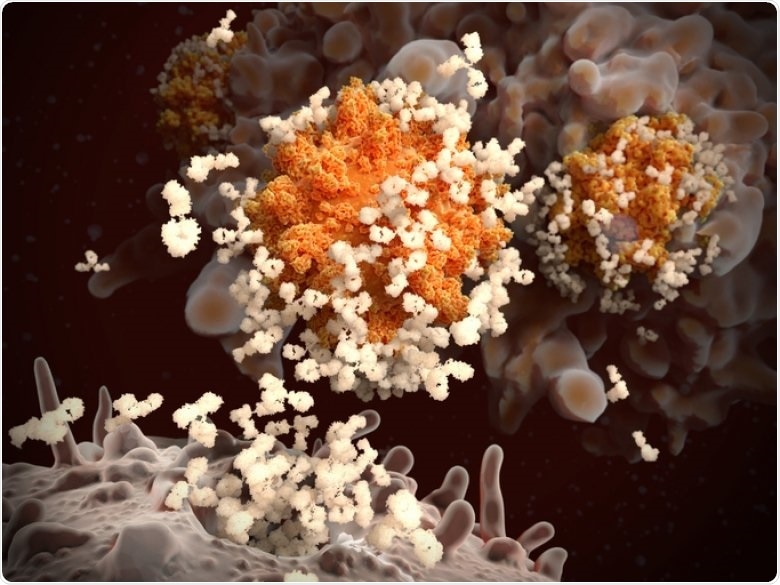Human bodies can tweak the immune response to an infection and make it proportional to the imminent threat. A recent study from the Karolinska Institutet in Sweden elaborates how B lymphocytes—antibody-producing immune cells—decide between various cell fates to balance the magnitude of the acute immune response and the memory response that safeguards from future threats.

Effector B cells produce antibodies against intruders such as viruses. Image Credit: Getty Images.
The research might play a vital role in the optimization of vaccines to combat viruses or other pathogens. The study was published in the journal Immunity.
An effective immune response to infections and vaccines needs antibodies—produced by specialized effector B cells of the immune system. Effector B cells make huge amounts of antibodies that combat the acute threat, while memory B cells protect individuals from future threats by swiftly creating new effector B cells producing antibodies, in case the intruder returns.
Until now, the knowledge of how the immune system regulates the balance between effector and memory B cells is inadequate.
An early wave of memory cells
In the current research, scientists from the Karolinska Institutet investigated the generation of B cells soon after infection and vaccination in animal models. They identified that B cells at an early stage carry out cell fate decisions that have impacts on the balance between the effector and memory response.
We show that there is an extensive early wave of memory cells that seems to be a ‘default’ fate for many activated B cells, and that these early memory cells seem to be equally long-lived as the traditional late wave of memory cells.”
Taras Kreslavsky, Assistant Professor, Department of Medicine, Solna, Karolinska Institutet
Kreslavsky, who led the research, added, “The early memory cells are kept as a reserve and can rapidly be re-activated and transformed into effector B cells if the threat increases. This way, our bodies can fine-tune the antibody response proportionally to the threat level.”
Could improve vaccine design
The scientists also demonstrated that the early memory response is evolutionarily conserved, which unlocks the likelihood of influencing the B cell response through vaccination in humans.
We believe that rational vaccine design may enable manipulation of the type of B cells that are formed and thus make the body’s defense more effective.”
Vassilis Glaros, Study First Author and Doctoral Student, Karolinska Institutet
Vassilis Glaros is a doctoral student in Taras Kreslavsky’s research team.
The scientists intend to further analyze how the early B cell response can be transformed and the impacts of distorting the response between effector and memory cell fates.
Crucial to our body’s defense
The memory B cells are crucial to our body’s defense against evolving pathogens, such as SARS-CoV-2 virus variants which cause COVID-19. Our memory cells are better equipped at adapting and parrying new variants than our effector cells are, and it is therefore critical for vaccines to elicit diverse memory B cell responses.”
Sebastian Ols, Study Co-Author and Doctoral student, Department of Medicine, Solna, Karolinska Institutet
Sebastian Ols is a doctoral student in Karin Loré’s research team.
Source:
Journal reference:
Glaros, V., et al. (2021) Limited access to antigen drives generation of early B cell memory while restraining the plasmablast response. Immunity. doi.org/10.1016/j.immuni.2021.08.017.